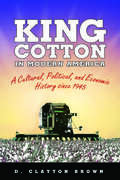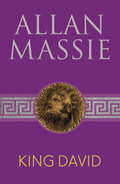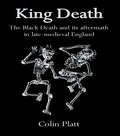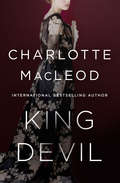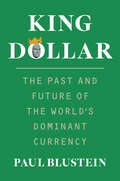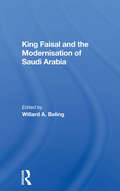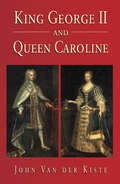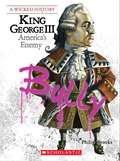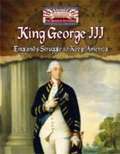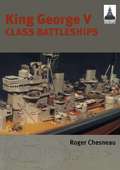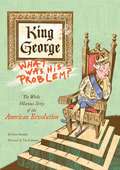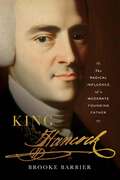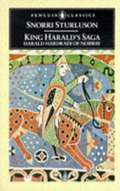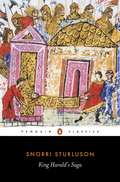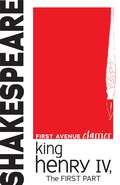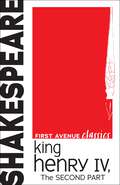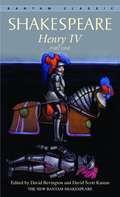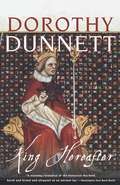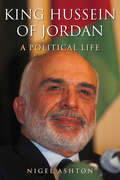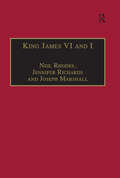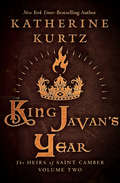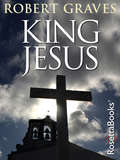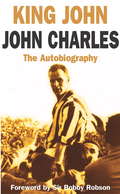- Table View
- List View
King Cotton in Modern America: A Cultural, Political, and Economic History since 1945
by D. Clayton BrownKing Cotton in Modern America places the once kingly crop in historical perspective, showing how "cotton culture" was actually part of the larger culture of the United States despite many regarding its cultivation and sources as hopelessly backward. Leaders in the industry, acting through the National Cotton Council, organized the various and often conflicting segments to make the commodity a viable part of the greater American economy. The industry faced new challenges, particularly the rise of foreign competition in production and the increase of man-made fibers in the consumer market.Modernization and efficiency became key elements for cotton planters. The expansion of cotton- growing areas into the Far West after 1945 enabled American growers to compete in the world market. Internal dissension developed between the traditional cotton growing regions in the South and the new areas in the West, particularly over the USDA cotton allotment program. Mechanization had profound social and economic impacts. Through music and literature, and with special emphasis placed on the meaning of cotton to African Americans in the lore of Memphis's Beale Street, blues music, and African American migration off the land, author D. Clayton Brown carries cotton's story to the present.
King David
by Allan Massie'David comes alive in this novel as a fascinating, divided self, but you also feel on finishing it that you have understood a little more about the extraordinary world of the Middle East from which so much of our own Judaeo-Christian religion and civilisation spring. Modern parallels are never forced - Massie to too subtle a writer for that - but this world of sex, intrigue, war and religious mania suggests constantly to the reader not memories of the Bible but events in the newspapers in that very Hebron where David ruled as king' AN Wilson, Evening Standard
King Death: The Black Death And Its Aftermath In Late-Medieval England
by Colin PlattThis illustrated survey examines what it was actually like to live with plague and the threat of plague in late-medieval and early modern England.; Colin Platt's books include "The English Medieval Town", "Medieval England: A Social History and Archaeology from the Conquest to 1600" and "The Architecture of Medieval Britain: A Social History" which won the Wolfson Prize for 1990. This book is intended for undergraduate/6th form courses on medieval England, option courses on demography, medicine, family and social focus. The "black death" and population decline is central to A-level syllabuses on this period.
King Devil
by Charlotte MacLeodA historical mystery set in early twentieth-century New England from the acclaimed author of the Peter Shandy series. Upon graduating from an academy for respectable young ladies, Lavinia Tabard heads to the New England countryside and her rich cousin Zilpha&’s summer cottage with the low expectations of a charity case. Lavinia intends to endure Zilpha&’s saccharine sweetness and her &“companion&” Tetsy&’s bullying ways only until she can plan an escape that doesn&’t involve marriage. A welcome distraction comes when, as she works on a grave rubbing at the local cemetery, Lavinia notices something strange about the dates on the stone. Her questions lead to the doorsteps of several interesting neighbors, including a self-made young architect with a temper as fiery as his red hair. Hayward Clinton and his partner have an office on Zilpha&’s property, an awkward situation that won&’t change until the mysterious disappearance of the business&’s original owner is solved. It&’s a case too curious for Lavinia to resist—but someone will stop at nothing to ensure that she does. King Devil is an entertaining tale of suspense from the acclaimed author of the Peter Shandy Mysteries, as well as the Boston-set Sarah Kelling and Max Bittersohn series.
King Dollar: The Past and Future of the World's Dominant Currency
by Paul BlusteinAn award-winning economic journalist on why the US dollar is positioned to maintain global primacy—and what that means for America and the world Prophecies that the dollar will lose its status as the world&’s dominant currency have echoed for decades—and are increasing in volume. Cryptocurrency enthusiasts claim that Bitcoin or other blockchain-based monetary units will replace the dollar. Foreign policy hawks warn that China&’s renminbi poses a lethal threat to the greenback. And sound money zealots predict that mounting US debt and inflation will surely erode the dollar&’s value to the point of irrelevancy. Contra the doomsayers, Paul Blustein shows that the dollar&’s standing atop the world&’s currency pyramid is impregnable, barring catastrophic policy missteps by the US government. Recounting how the United States has wielded the dollar to impose devastating sanctions against adversaries, Blustein explains that although targets such as Russia have found ways to limit the damage, Washington&’s financial weaponry will retain potency long into the future. His message, however, is that America must not be complacent about the dollar; the great power that its supremacy confers comes with commensurate responsibility.
King Faisal And The Modernisation Of Saudi Arabia
by Willard A. BelingThe late King Faisal bin Abdul Aziz was born in Riyadh in 1905/6, several years after his father Abdulaziz Ibn Saud had recaptured it from Ibn Rashid. In 1964 he became king of Saudi Arabia, famous for harbouring twenty five percent of the world's oil reserves and hailed as the most powerful Arab ruler in centuries. In 1975, his nephew shot him in
King George II and Queen Caroline
by John Van der KisteThis biography of the last king to lead British troups into baffle and his able wife provides intriquing insight into 18th century war and politics. Often derided as the buffoon who "hated all boets and bainters", George II was fortunate to be served by Prime Ministers Sir Robert Walpole and William Pitt, and was wise enough to leave the business of government to them. His wife, generally regarded as the ablest of British queens between Elizabeth I and Queen Victoria, used her influence in politics and patronage so that she and Walpole effectively ruled the kingdom between them. Her death in 1737 was seen as a national calamity. Illustrated throughout, this new biography provides a much-needed reevaluation of these monarchs and the times in which they ruled.
King George III: America's Enemy
by Philip BrooksA children's biography of King George III, who was King of England during the American revolution.
King George III: England's Struggle to Keep America
by Steve RobertsKing George III who ruled Great Britain, is remembered as the "king who lost America". This book covers his life and reign of the British Empire.
King George V Class Battleships (ShipCraft #2)
by Roger ChesneauThe ShipCraft series provides in-depth information about building and modifying model kits of famous warship types. Lavishly illustrated, each book takes the modeller through a brief history of the subject class, highlighting differences between sister-ships and changes in their appearance over their careers. This includes paint schemes and camouflage, featuring colour profiles and highly-detailed line drawings and scale plans. The modelling section reviews the strengths and weaknesses of available kits, lists commercial accessory sets for super-detailing of the ships, and provides hints on modifying and improving the basic kit. This is followed by an extensive photographic gallery of selected high-quality models in a variety of scales, and the book concludes with a section on research references books, monographs, large-scale plans and relevant websites.The five battleships of the class covered by this volume were the most modern British capital ships to serve in the Second World War. They were involved in many famous actions including the sinking of both Bismarck and Scharnhorst, while Prince of Wales suffered the unfortunate distinction of being the first capital ship sunk at sea by air attack.
King George: What Was His Problem? - Everything Your Schoolbooks Didn't Tell You About The American Revolution
by Steve SheinkinKING GEORGE NEVER DID UNDERSTAND AMERICANS. "Entire books have been written about the causes of the American Revolution. This isn't one of them. "What it is, instead, is utterly interesting, anecdotes (John Hancock fixates on salmon), from the inside out (at the Battle of Eutaw Springs, hundreds of soldiers plunged into battle "naked as they were born") close-up narrative filled with little-known details, lots of quotes that capture the spirit and voices of the principals ("If need be, I will raise one thousand men, subsist them at my own expense, and march myself at their head for the relief of Boston" - George Washington), and action, It's the story of the birth of our nation, complete with soldiers, spies, salmon sandwiches, and real facts you can't help but want to tell to everyone you know. King George: What Was His Problem? is a 2009 Bank Street - Best Children's Book of the Year.
King Hancock: The Radical Influence of a Moderate Founding Father
by Brooke BarbierA rollicking portrait of the paradoxical patriot, whose measured pragmatism helped make American independence a reality.Americans are surprisingly more familiar with his famous signature than with the man himself. In this spirited account of John Hancock’s life, Brooke Barbier depicts a patriot of fascinating contradictions—a child of enormous privilege who would nevertheless become a voice of the common folk; a pillar of society uncomfortable with radicalism who yet was crucial to independence. About two-fifths of the American population held neutral or ambivalent views about the Revolution, and Hancock spoke for them and to them, bringing them along.Orphaned young, Hancock was raised by his merchant uncle, whose business and vast wealth he inherited—including household slaves, whom Hancock later freed. By his early thirties, he was one of New England’s most prominent politicians, earning a place on Britain’s most-wanted list and the derisive nickname King Hancock. While he eventually joined the revolution against England, his ever moderate—and moderating—disposition would prove an asset after 1776. Barbier shows Hancock appealing to southerners and northerners, Federalists and Anti-Federalists. He was a famously steadying force as president of the fractious Second Continental Congress. He parlayed with French military officials, strengthening a key alliance with his hospitable diplomacy. As governor of Massachusetts, Hancock convinced its delegates to vote for the federal Constitution and calmed the fallout from the shocking Shays’s Rebellion.An insightful study of leadership in the revolutionary era, King Hancock traces a moment when passion was on the side of compromise and accommodation proved the basis of profound social and political change.
King Harald's Saga
by Magnus Magnusson Hermann PalssonThe story of King Harald (The Ruthless) of Norway, a contemporary of King Harold of England and William The Conqueror of Normandy. Harald attempted to claim for Norway the English throne and succeeded in marching to Chelsea before his army was defeated by English King Harold's troops and Harald was killed. Harold himself was defeated only nineteen days later by William of Normandy. Harald's demise though marked the end of the Viking era, of centuries of Scandinavian harrassment of England. Magnusson and Palsson wrote the introduction and translated the saga into English.
King Harald's Saga
by Snorri SturlusonThis compelling Icelandic history describes the life of King Harald Hardradi, from his battles across Europe and Russia to his final assault on England in 1066, less than three weeks before the invasion of William the Conqueror. It was a battle that led to his death and marked the end of an era in which Europe had been dominated by the threat of Scandinavian forces. Despite England's triumph, it also played a crucial part in fatally weakening the English army immediately prior to the Norman Conquest, changing the course of history. Taken from the Heimskringla - Snorri Sturluson's complete account of Norway from prehistoric times to 1177 - this is a brilliantly human depiction of the turbulent life and savage death of the last great Norse warrior-king.
King Henry IV, The First Part (First Avenue Classics ™)
by William ShakespeareThe year is 1402, and King Henry IV sits uneasily on the throne that he wrested from his predecessor, Richard II. King Henry disapproves of his son, Prince Henry, and his habit of hanging around criminals like the witty but dishonest Falstaff. Meanwhile, young "Hotspur" Percy helps his family plot a rebellion to overthrow the king. Civil war is imminent, and the fate of the kingdom will be decided in a great battle at Shrewsbury. Faced with bloodshed, Prince Henry must find it within himself to be the son and heir his father has always wanted him to be. First published in 1598, this unabridged version of William Shakespeare's history play is the second in his tetralogy about the rise of the English royal House of Lancaster.
King Henry IV, The Second Part (First Avenue Classics ™)
by William ShakespeareIn this second part of Henry IV, the Battle of Shrewsbury is over, the rebels temporarily beaten but not defeated. Prince Henry defeated "Hotspur" Percy in single combat, but other rebel leaders have taken his place. King Henry, drained by the civil war, is deathly ill. Prince Henry, knowing he must soon assume the throne, tries to distance himself from the rowdy and reprobate friends of his youth, including Falstaff. As rebel forces gather at the Forest of Gaultree and King Henry grows sicker, will Prince Henry be able to prove to his father that he has become worthy of wearing the crown? First published in 1600, this unabridged version of William Shakespeare's history play is the third in his tetralogy about the rise of the English royal House of Lancaster.
King Henry V
by William Shakespeare David Bevington David Scott Kastan James Hammersmith Robert Kean Turner Joseph PappA play alive with escapades and action, comedy and history, "Henry IV, Part One begins the transformation of the madcap Prince Hal into the splendid ruler King Henry. In it a rebellion against King and State is juxtaposed with another rebellion-the riotous misbehavior of Hal and his companions, principally Falstaff. A superbly funny liar, coward, lecher, and cheat, the larger-than-life character Falstaff turns this great historical drama into a masterpiece of counterpoint and design. Each Edition Includes: - Comprehensive explanatory notes - Vivid introductions and the most up-to-date scholarship - Clear, modernized spelling and punctuation, enabling contemporary readers to understand the Elizabethan English - Completely updated, detailed bibliographies and performance histories - An interpretive essay on film adaptations of the play, along with an extensive filmography Copyright © Libri GmbH. All rights reserved.
King Hereafter
by Dorothy DunnettBack in print by popular demand--"A stunning revelation of the historical Macbeth, harsh and brutal and eloquent." --Washington Post Book World.With the same meticulous scholarship and narrative legerdemain she brought to her hugely popular Lymond Chronicles, our foremost historical novelist travels further into the past. In King Hereafter, Dorothy Dunnett's stage is the wild, half-pagan country of eleventh-century Scotland. Her hero is an ungainly young earl with a lowering brow and a taste for intrigue. He calls himself Thorfinn but his Christian name is Macbeth.Dunnett depicts Macbeth's transformation from an angry boy who refuses to accept his meager share of the Orkney Islands to a suavely accomplished warrior who seizes an empire with the help of a wife as shrewd and valiant as himself. She creates characters who are at once wholly creatures of another time yet always recognizable--and she does so with such realism and immediacy that she once more elevates historical fiction into high art.rade Paperback edition.
King Hussein Of Jordan: A Political Life
by Nigel AshtonA towering figure in the history of Jordan, King Hussein reigned for nearly half a century, from his grandfather's assassination in 1953 to his own death in 1999. In this fascinating biography, Nigel Ashton recounts the eventful life of the king who not only survived but flourished amidst crisis after crisis as ruler of a poor desert nation surrounded by powerful and hostile neighbors. Hussein skillfully navigated complicated relationships with the British, his fellow Arab leaders, the new bordering state of Israel, masses of dispossessed Palestinians within his kingdom, every U. S. president from Eisenhower to Clinton, and every British prime minister from Churchill to Blair. This book illuminates the private man, his key relationships, and his achievements and disappointments as a central player in the tough world of Middle Eastern politics. Ashton has had unique access to King Hussein's private papers, including his secret correspondence with U. S. , British, and Israeli leaders, and he has also conducted numerous interviews with members of Hussein's circle and immediate family. The resulting book brings new depth to our understanding of the popular and canny king while also providing new information about the wars of 1967 and 1973, President Reagan's role in the Iran-Contra affair, the evolution of the Middle East peace process, and much more.
King James VI and I and the Reunion of Christendom
by W. B. PattersonThis is a historical study of the career of King James VI and I, as king of Scotland (1567-1625) and England (1603-1625), who achieved a union of the crowns as the first king of Great Britain, and who undertook to end the recurring religious wars. His peacemaking by diplomatic means was complemented by his efforts to foster closer relations among the churches. The peace that he helped to maintain by these initiatives, though cut short by the coming of the Thirty Years' War, was immensely beneficial both to Britain and to the other countries of Europe.
King James VI and I: Selected Writings
by Neil Rhodes Jennifer Richards'Yet hath it been ever esteemed a matter commendable to collect [works] together, and incorporate them into one body, that we may behold at once, what divers Off-springs have proceeded from one braine.' This observation from the Bishop of Winchester in his preface to King James's 1616 Workes is particularly appropriate, since James's writings cross the boundaries of so many different fields. While several other monarchs engaged in literary composition, King James VI and I stands out as 'an inveterate scribbler' and is certainly the most extensively published of all British rulers. King James VI and I provides a broad representative selection of King James's writings on a range of secular and religious topics. Each text is provided in full, creating an invaluable reference tool for 16th and 17th century scholars working in different disciplines and a fascinating collection for students and general readers interested in early modern history and literature. In contrast to other editions of James's writings, which have been confined to a single aspect of his work, the present edition brings together for the first time his poetry and his religious writing, his political works and his treatises on witchcraft and tobacco, in a single volume. What makes this collection of James's writings especially significant is the distinctiveness of his position as both writer and ruler, an author of incontestable authority. All his authorly roles, as poet, polemicist, theologian, political theorist and political orator are informed by this fact. James's writings were also inevitably influenced by the circumstances of his reigns and this volume reflects the turbulent issues of religion, politics and nationhood that troubled his three kingdoms.
King Javan's Year (The Heirs of Saint Camber #2)
by Katherine KurtzA young king&’s ascension threatens a traitorous conspiracy of powerful nobles who plan to brutally eliminate all magic-users from their medieval realm The brief reign of Alroy Haldane is nearly at an end, as the life of the young king of Gwynedd slowly slips away. Called back from the abbey where he has sought sanctuary for the last three years, Alroy&’s twin, Prince Javan, prepares to ascend the throne—against the wishes of the former regents, who plan to enslave or destroy all Deryni in the kingdom. Though human, Javan secretly possesses the psychic powers of the magical race that the powerful faction of great lords and religious zealots strives to eliminate—and it is this ability that alerts him to the terrifying scope of their dark treachery. While his enemies do not yet realize how determined a foe the young liege is, Javan must summon remarkable courage and cunning if he hopes to prevail against them—or even survive. In the middle chapter of her enthralling medieval fantasy trilogy, the Heirs of Saint Camber, award-winning author Katherine Kurtz adds richness and depth to the alternate world she has so magnificently brought to life in three previous series. Blending exquisitely detailed history with breathtaking invention, Kurtz proves once again that she is without equal in the popular realm of fantasy fiction.
King Jesus (FSG Classics)
by Robert Graves&“Both the knowledge of a scholar and the imagination of a poet are brought to bear upon Jesus as child, boy, and man. . . . A bold speculative adventure&” (Harold Brighouse, Manchester Guardian). In Robert Graves&’s unique retelling, Jesus is very much a mortal and the grandson of King Herod the Great. When his father runs afoul of the king&’s temper and is executed, Jesus is raised in the house of Joseph the Carpenter. The kingdom he is heir to, in this version of the story, is very much a terrestrial one: the Kingdom of Judah. Graves tells of Jesus&’s rise as a philosopher, scriptural scholar, and charismatic speaker in sharp detail, as well as his arrest and downfall as a victim of pitiless Roman politics. Bringing together his unparalleled narrative skill and in-depth expertise in historical scholarship, renowned classicist and historical novelist Robert Graves brings the story of Jesus Christ to life in a strikingly unorthodox way, making this one of the most hotly contested novels Graves ever wrote—and possibly one of the most controversial ever written. It provides a fascinating new twist to a well-known story, one that fans of this historical period are sure to love. &“This is not reading for the easily shocked; it definitely presents Jesus as a sage and a [poet], if not divine. It moves, as does all Mr. Graves&’ writing, at a brilliant fast pace, and with a tremendous style.&” —Kirkus Reviews
King John
by John CharlesSir Bobby Charlton reckons that if John Charles were playing today, his transfer value would be £70 million; and in a recent poll of Italian football fans, they voted him the greatest foreign player ever to play in their league, ahead of Maradona and Platini. He was equally adept as a centre forward or centre half, and often Juventus would play him up front until he scored, and then move him back into defence to protect the lead.Whether playing for Leeds United, Wales or Juventus, he fully earned his nickname of the 'Gentle Giant', never once being booked or sent off in a 15-year career, and always being the epitome of sportsmanship. KING JOHN recalls not just a vanished era of football, but also highlights what happens to our heroes once they have left the spotlight. It is a warm and moving account from one of football's true legends.
King John
by John CharlesSir Bobby Charlton reckons that if John Charles were playing today, his transfer value would be £70 million; and in a recent poll of Italian football fans, they voted him the greatest foreign player ever to play in their league, ahead of Maradona and Platini. He was equally adept as a centre forward or centre half, and often Juventus would play him up front until he scored, and then move him back into defence to protect the lead.Whether playing for Leeds United, Wales or Juventus, he fully earned his nickname of the 'Gentle Giant', never once being booked or sent off in a 15-year career, and always being the epitome of sportsmanship. KING JOHN recalls not just a vanished era of football, but also highlights what happens to our heroes once they have left the spotlight. It is a warm and moving account from one of football's true legends.
